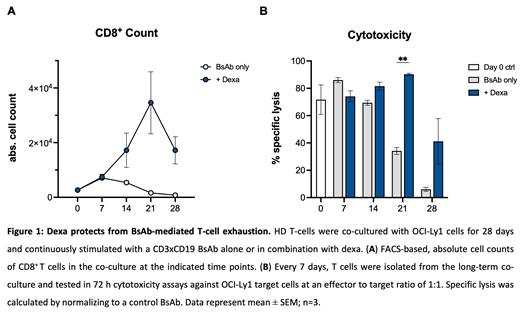Following the approval of blinatumomab in 2015 T-cell recruiting bispecific antibodies (BsAbs) became the established standard-of-care for relapsed or refractory (r/r) and minimal residual disease positive B-cell precursor acute lymphoblastic leukemia. More recently, there has been a notable increase in the approval of additional BsAb constructs for malignancies such as r/r follicular lymphoma, r/r large B-cell lymphoma, and advanced multiple myeloma (MM), with further approvals anticipated. Despite the clinical success, administration of BsAbs is commonly linked to dose-limiting immune-related adverse events (IrAEs), such as cytokine release syndrome, possibly compromising treatment efficacy. Hence, current BsAb as well as CAR T approvals integrate prophylactic and acute glucocorticoid (GC) application upon occurrence of IrAEs. Surprisingly, despite their immunosuppressive nature, GC administration had no negative impact on response or survival of MM patients receiving CAR T-cell therapy (Wang 2022). Based on these data, we hypothesize that the GC-mediated downregulation of BsAb-induced T-cell function has a dual effect: mitigating IrAEs and ameliorating T-cell exhaustion. Here we tested the effect of simultaneous administration of the GC dexamethasone (dexa) and a CD3xCD19 targeting BsAb on T-cell function and exhaustion.
We first evaluated the short-term effect of dexa exposure on BsAb-mediated cytotoxicity by co-culturing healthy donor (HD) T cells with CD19 + cell lines and stimulating with a CD3xCD19 BsAb alone or in combination with 300nM dexa for 3-5 days. In fact, the addition of dexa decreased BsAb-mediated tumor cell lysis against OCI-Ly1 cells after 3 days, but not after 5 days. Surprisingly, however, T-cells showed a significantly increased expansion upon dexa exposure after 3 and 5 days (day 3: Ki-67 MFI ratio BsAb=337.2, +dexa=676.0, p=0.008; day 5: CD2 +-fold change to day 0 BsAb only=7.1; +dexa=11.6; p=0.01). In cytotoxicity assays against murine Ba/F3 cells transduced with human CD19 with or without the co-stimulatory molecule CD86, T cells showed significantly reduced BsAb-mediated cytotoxicity and proliferation upon dexa exposure in the absence of CD86. Intriguingly, however, T-cell function was rescued upon CD86 co-expression.
To evaluate long-term effects of GCs on T-cell function and exhaustion, we next used our established long-term in vitro model system to mimic continuous stimulation of T cells with a BsAb ± GCs. HD T cells were co-cultured with CD19 + OCI-Ly1 cells for 28 days and continuously stimulated with a CD3xCD19 BsAb alone or in combination with dexa. T-cell fitness was assessed longitudinally.
Surprisingly, but in line with our short-term data, we found increased CD8 + T-cell expansion upon BsAb +dexa co-exposure in long-term cultures (abs. CD8 + cell count day 21 BsAb=1.613, +dexa=34.583). Furthermore, immunophenotyping revealed similar upregulation of the checkpoint inhibitors PD-1, Tim-3, Lag-3 after 7 days. On day 21, however, Lag-3 expression on dexa exposed CD4 + and CD8 + T cells was decreased (MFI ratio BsAb=10.5, +dexa=1.7, p=0.02). Inflammatory cytokine (IL-2, IFN-γ, TNF-α) levels were decreased in the supernatant of dexa-exposed vs BsAb only co-cultures. However, low levels of IFN-γ were maintained in the dexa co-exposed condition over 24 days (mean level IFN-γ day 24 BsAb=53pg/ml, +dexa=1756 pg/ml). Finally, T cells were isolated from cultures every 7 days and tested in 72h cytotoxicity assays, without further exposure to dexa. Intriguingly, T cells previously exposed to dexa maintained a significantly higher cytotoxicity over 28 days (mean % specific lysis day 21 BsAb=34.2, +dexa=90.3, p=0.004).
Taken together, our data demonstrate a positive impact of GCs on BsAb-mediated T-cell expansion in short- and long-term setting. Characterization of T cells upon long term BsAb exposure demonstrated an ameliorating effect of GCs on BsAb-induced T-cell exhaustion. Our data suggest that dampening of T-cell activity by GC administration in BsAb-treated patients could serve two purposes: managing IrAEs while simultaneously ameliorating T-cell exhaustion and improving T-cell persistence. In future studies we will further dissect the effect of dexa on the transcriptional landscape of BsAb-stimulated T cells by performing RNA sequencing and also explore the effect of GCs on CAR T-cell function.
Disclosures
Buecklein:Pierre Fabre: Other: Travel Funding; Priothera: Consultancy; Roche: Honoraria, Research Funding; Miltenyi Biotech: Research Funding; Gilead/Kite: Other: Travel Funding, Research Funding; Pfizer: Consultancy, Honoraria, Speakers Bureau; BMS: Research Funding; Amgen: Consultancy. Subklewe:Ichnos Sciences: Consultancy, Honoraria; Roche: Consultancy, Honoraria, Other: Travel Support, Research Funding, Speakers Bureau; Pfizer: Consultancy, Honoraria, Other: Travel Support, Speakers Bureau; Miltenyi Biotec: Consultancy, Honoraria, Research Funding; Novartis: Consultancy, Honoraria, Research Funding, Speakers Bureau; Gilead/Kite: Consultancy, Honoraria, Other: Travel Support, Research Funding, Speakers Bureau; Janssen: Consultancy, Honoraria, Research Funding, Speakers Bureau; AstraZeneca: Speakers Bureau; Amgen: Consultancy, Honoraria, Research Funding; Takeda: Consultancy, Honoraria, Research Funding; Seagen: Research Funding; BMS/Celgene: Consultancy, Honoraria, Research Funding, Speakers Bureau; AvenCell: Consultancy, Honoraria; Incyte Biosciences: Consultancy, Honoraria; Molecular Partners: Consultancy, Honoraria, Research Funding; GSK: Speakers Bureau; LAWG: Speakers Bureau; Springer Healthcare: Speakers Bureau; AbbVie: Consultancy, Honoraria; Autolus: Consultancy, Honoraria; advesya (CanCell Therapeutics): Consultancy, Honoraria; Genmab US: Consultancy, Honoraria; Interius BioTherapeutics: Consultancy, Honoraria; Nektar Therapeutics: Consultancy, Honoraria; Orbital Therapeutics: Consultancy, Honoraria; Sanofi: Consultancy, Honoraria; Scare: Consultancy, Honoraria.


